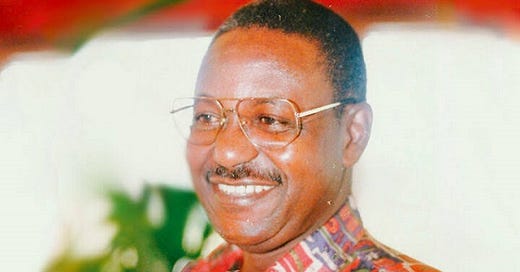Peter Enahoro: Exit of legendary wordsmith
By Alao Abiodun
Popular English poet and playwright, Williams Shakespeare, once opined that the world is a stage and each person plays his part and leave. The demise of veteran journalist, Peter Enahoro, has reinforced this belief. Enahoro has joined the saints triumphant, at 88, leaving in his wake indelible imprints on the sands of time.
Popularly known by his pen name, Peter Pan, Enahoro has played his part and quit the worldly stage. Since his demise, a lot of tributes have been written about him.
The surfeit of tributes that have trailed his demise, substantiates Shakespeare’s contemplation and summation of death in its nuances. The glowing tributes, however, highlight how Enahoro meant different things to different people, at different points in time.
To some persons, Enahoro was a builder of talents, who groomed so many proteges. He simply wanted all his disciples to succeed. He was always mentoring people in his main constituency — the newsroom. The deceased is also remembered for lending his voice to advance the cause of the voiceless.
Some also remember him as the hero, whose historic exploits enrich the narrative about journalism, even in his wake. His works have covered most of Africa’s major events of the last four decades. Not only did he travel extensively across Africa; but his career also took him all over the world. Enahoro undoubtedly earned a special place in the hearts of many members of the fourth estate of the realm.
Born January 21, 1935, to the political family of Enahoro in Uromi, Edo State, Nigeria, as one of ten siblings, his Esan parents were Asuelimen Okotako Enahoro and Princess Inibokun (née Okojie). His maternal grandfather was the Onogie of Uromi, Ogbidi Okojie. His eldest brother was a statesman and politician, Chief Anthony Enahoro.
The deceased schooled at St. Stephens Elementary School, Akure (Ondo State); CMS Primary School, Ado-Ekiti (Ondo State); Government School, Ekpoma (Edo State), St. David’s School, Akure (Ondo State), Government School, Warri (Delta State), before graduating from Government College, Ughelli (Delta State) in 1948.
He started his media career as an Assistant Publicity Officer (now called Federal Ministry of Information) in 1954. He later joined the Daily Times as a sub-editor in 1955, at the age of 20, before moving on to serve as the Assistant District Manager at Rediffusion Services, Ibadan, in 1957.
In what appears to be a record-breaking feat, Enahoro became the Editor of the Nigerian Sunday Times in 1958 at the age of 23, and Features Editor of the Daily Times in 1958, then the paper’s Editor in 1962, going on to become the Daily Times Group Editorial Adviser in 1965, and in 1966, he became Editor-in-Chief of the Daily Times.
Enahoro was Contributing Editor of Radio Deutsche Welle in Cologne, Germany, from 1966 to 1976, and was Africa Editor of National Zeitung, in Basel, Switzerland, becoming Editorial Director of New African magazine in London in 1978.
Recounting his transit into self-exile, Enahoro acknowledged fleeing Nigeria as a 31-year-old in the 1960s. He embarked on a self-imposed exile that would last for 13 years. This was unconnected to the 1966 Civil War. He first returned in 1979 before leaving, again, in 1990. His books — How To Be A Nigerian and The Complete Nigerian — were written when he returned to Nigeria.
In his heyday, his “Peter Pan” column that he began writing in 1959 was a delight to read. He wrote on topical issues. He established himself as one of the best columnists in the country. Frank Barton in his book, The Press of Africa, described Enahoro as “arguably Africa’s best journalist writing in the English language”.
Thousands of readers who encountered him through his literature have retained him in their memories. They eulogised his style of writing. His stance on issues, according to readers, was quite diverse thus triggering different perceptions of his persona. Enahoro was not just a writer, he was equally gifted with a loud voice that commanded international attention.
A lecturer at the Nigerian Institute of Journalism (NIJ), Dr Dele Omojuyigbe in his tribute, recalled how Enahoro had three personalities lodged in one body in his newspaper journey in Daily Times – Peter Enahoro, Peter Pan, and George Sharp, and how he wrote separately under the three names in the Sunday Times in the late fifties.
Enahoro clearly established an inspiring legacy in journalism hence observers wonder why he was not given any national honour in his lifetime. Perhaps a posthumous award would be considered in his wake.
The Nation



